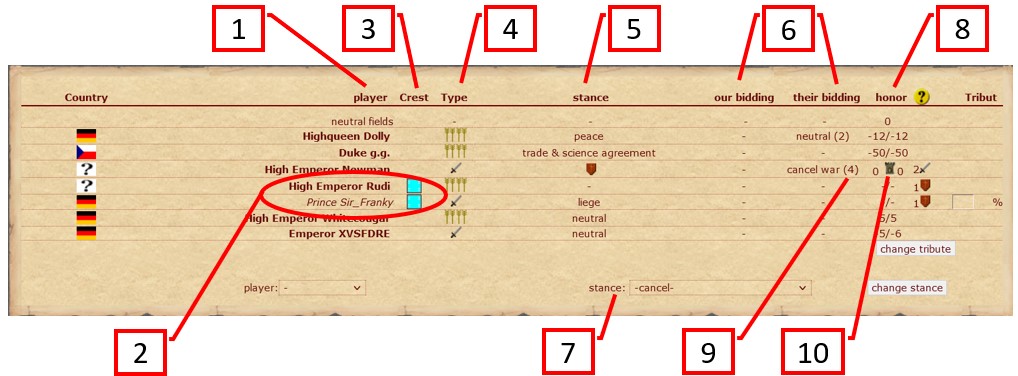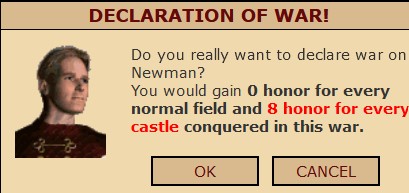Diplomacy and alliances
How to contact other players
You always automatically get diplomatic contacts with all empires that border one of your fields. You also get contact if your ship visits their land, their ship visits your land, or your ship meets their ship. Diplomatic contacts remain till the end of the game, even if empires don’t border each other any more by changing the owner. If you form an alliance with another player or enter an pre-existing alliance, all players get the diplomatic contacts of all other members.
Contracts
Contracts are formed between individual players (1) or alliances. An alliance is treated like a single player with respect to diplomacy (2). Within an alliance, only the liege lord can sign diplomatic contracts (also see alliances.
Whether a player is a member of an alliance is indicated by a crest next to his name (3). Additionally, you can see whether the player is a Settler or a Warrior (4). In the diplomacy menu you can also see the current diplomatic status (5) and the diplomatic offers (6) of a specific player.
The basic diplomatic stance to other realms is neutrality. Under "diplomacy" in the left hand menu players may offer a diplomatic contract to their contacts, for example a non-aggression pact. Such contracts are signed when the other player accepts that offer. Exceptions are declarations of war, which can be declared by just one side. All contracts may be cancelled by any contract-partner. If both parties agree to the cancellation of the contract, it takes place immediately. However, wars can only be cancelled by the original aggressor.
The following diplomatic contracts are available:
Peace
Peace is the basic requirement for trade agreements and research co-operations. Espionage is not possible between players who are at peace. Declaring yourself neutral again takes 96 turns unless both parties agree to be neutral again.
Non-aggression pact
Changing the diplomatic stance back to "neutral" takes 48 turns to become effective. Espionage is possible.
Neutral
This is the basic diplomatic stance. Declarations of war take 8 turns.
War
Hostile realms can be attacked after you declared war to the respective player. An attack is possible starting with the first tick when the war becomes active; this means that army orders for attacking in this tick can be placed in advance in the tick before. War can not be declared against players under noob-protection.
A declaration of war takes 8 turns. It is only possible to declare war on neutral players. If a peace treaty or NAP is in place, you have to change your diplomatic stance back to neutral before you can declare war. You cannot take back a declaration of war.
War Duration and Honor
Wars are always declared for a limit duration. Wars can run for 50 (raid), 200 (blitzkrieg), or 400 (campaign, warrior only) turns. After this time the war will automatically terminated. Of course you can always attack an opponent a second time after a war has ended, however the honor conditions may be different then (see below).
Wars against smaller players/alliances cost honor. In the column "honor" (8) you can see how much honer conquering a field of a player will const you, depending on the type of war. In general, a war against a player who has at least 90% (campaign), 80% (blitzkrieg), or 70% (raid) or your point, will be honorable; in alliances, the points of all allymembers are added together. Additionally, ongoing ware of the defending player will also enter the calculation (more details under Honour).
When a war in honorable, you can even gain honor, when you conquer a castle of an enemy. Before you send a declaration of war, an extra popup window will open which again shows how much honor per field and per castle you would loose. At this time point, you still can cancel your declaration of war.
As soon as the war has started, you will also see the remaining time in the diplomacy menu (10) and how much honor you currently loose or gain for each field or castle. The honor gain/loss per castle is indicated by a castle icon (11).
Cancel war
Das vorzeitige Beenden eines Krieges dauert 50 Ticks. Durch Beenden eines Krieges werden die diplomatischen Beziehungen auf neutral gesetzt. Nur der Spieler, der zuerst den Krieg erklärt hat, kann diesen Krieg auch einseitig beenden. Selbst wenn der Kriegsgegner die Kriegsklärung erwidert hat, kann er den Krieg nicht von sich aus beenden.
Ending a war prematurely takes 50 turns. The diplomatic stance is automatically set to neutral after cancellation of a war.
Only the player who has declared the war can cancel this war. Even if the war opponent has returned the war declaration, he cannot cancel the war by himself. I
Trade agreement
A trade agreement between two realms gives both parties a bonus on the income of gold, ore, logs, stone, coal and grain. The smaller partner of a trade agreement has a higher profit compared to the larger partner. Players can have as many agreements as they want. However, trade agreements with players not belonging to the own alliance can create a maximum of 17 % bonus. In addition there is a 4 per cent bonus increase for every alliance member (irrespective to their size). That way one can reach a bonus maximum of 25 % having a full alliance and an honour level of 1000.
Research collaboration
Similar to the trade agreement, both partners of a research collaboration increase their output of research points. Here too, the maximum research bonus is 25 % (at an honour level of 1000): 17 % given by players not belonging to the own alliance and 4 % through each member of your alliance.
Becoming a vassal
A vassal serves his liege. Vassals automatically engage in a military collaboration, a trade agreement and a research collaboration with their liege and other vassals of that liege (10% bonus for each member). An alliance has a minimum duration of 200 turns. The secession of an vassal from an alliance takes 150 turns; This time can be reduced to 100 turns if both parties want to end the alliance. Therfore, the minimum total time before an alliance can be ended again is 300 turns. Afterwards, the diplomatic stance to all members of the former alliance is neutrality.
Becoming a liege
A liege can have up to two vassals in his alliance. As a liege you can also demand tribute from all goods your vassals produce. How much tribute you can demand depends on the difference in rank between you and your vassal. The higher the difference, the more tribute you can ask for.
Noob protection
To allow beginners and restarted some time for orientation and strengthening their realm, they are given "diplomatic protection" fo some time. These players are marked in green under "diplomacy", can not declare war and can not receive declarations of war. Furthermore they cannot become victims of espionage actions and cannot perform espionage actions. This protection ceases with a score of 60,000 at the beginning of the age. Every 50 turns this limit is increased by 6,000 points for newly starting players.
Alliances
Alliance are formed by players accepting up to twoother players as vassals by diplomatic means, effectively becoming their liege. This requires some form of diplomatic contact, either by bordering lands or visiting ships.
When you are in an alliance you automatically adopt the diplomatic stance of your liege lord. Only the liege can sign treaties, when the liege goes to war, all vassals must follow.
Alliances have a minmum duration of 200 turns, before a petition for secession can be filed. A unilateral termination will take 150 turns whereas a mutually agreed termination only takes 100 turns. In total, termination of an alliance therfore takes at least 300 turns.
New vassals can only joint the ally at peace time, i.e. neither the liege, nor the new vassal must have ongoing wars or declarations of war.
Lieges can demand tribute from every one of their vassals who is of lower titel. The tribute can be at most double as high as the difference in titels. For example, a liege that is 2 titels higher than the vassals may ask for up to 4% tribute. The adjusted height of the tribute is not adapted automatically, if the order of rank between liege and vasall changes. Vassals have no way to reject the demand for tribute, except for seceding from the alliance. A good liege, however, is more interested in helping his vassals with word and deed than to burden them with tribute.
With foundation of an alliance an alliance depot is provided, which is located in the stock.
Besides the collaboration in trade and research, allies also have a military collaboration. This means:
- Armies can cross fields from allies similar to owned lands.
- Armies can defend the lands of allies and attack joined with allied forces. Joined espionage and ship combats at sea are similarly possible.
- Armies, ships, and spies can facilitate allied buildings (castles, harbours, thieves' guilds) for rest, repairs, embarking, and further training, respectively.
- However, armies can only be loaded on ships of the armies' owner.
If the alliance leader is defeated or deleted from the game due to inactivity, the alliance is not disbanded. Instead, the alliance member with the highest score becomes the new leader of the alliance. This does not change any ongoing diplomatic actions.
Players in alliances should be aware of the following:
- If players of an alliance attack together, the owner of the field from which the attack has taken place gets the field. If the attack from different fields took place, it is decided by chance.
- If a player conquers a field with his armies attacking from an allies' area, he will be the owner of the conquered field. This means that a player may have a realm containing islands of area withing another players realm.
- Allied armies are shattered when they are placed on a field owned by an ally and that ally is defeated. They return to the closest castle within a few rounds. This applies also to allies that are deleted due to inactivity or that leave the alliance. An army assisting in the defense of an allied castle fights until the last unit, and therefore the army, is destroyed. The owner of the ally receives the respective combat reports.
- The situation of allied ships in an harbor is similar. If a harbor is torn down or destroyed due to conquering or deletion of the player because of inactivity, the ships are placed on a water field next to the former harbor. However, if the harbor itself is conquered, then all ships are destroyed.
Special Rules
Arranging wars only to increase the honor penalty of potential opponents (self-serving wars) are prohibited. Therefore wars have to be actively conducted (this means conquering fields, spy actions, ship battles, etc.). Administrator will check wars regulatory and breaking this rule is punished with temporal bans. However, we hope that our players stick to this rule and the administrators don't have to interfere. Every player agrees to this rule by accepting our TOU.


